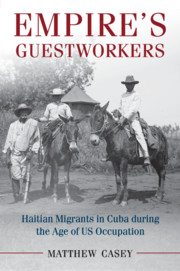Book contents
- Frontmatter
- Contents
- List of Figures, Maps, and Tables
- Acknowledgments
- Introduction
- Prologue: Experiencing the Unevenness of Empire
- 1 Making the Haitian Cuban Border and Creating Temporary Migrants
- 2 Leaving US-Occupied Haiti
- 3 Living and Working on Cuban Sugar Plantations
- 4 Picking Coffee and Building Families in Eastern Cuba
- 5 Creating Religious Communities, Serving Spirits, and Decrying Sorcery
- 6 Mobilizing Politically and Debating Race and Empire in Cuban Cities
- 7 Returning to Haiti and the Aftermath of US Occupation
- Epilogue: Enduring Legacies and Post-Colonial Divergences
- Bibliography
- Index
5 - Creating Religious Communities, Serving Spirits, and Decrying Sorcery
Published online by Cambridge University Press: 27 April 2017
- Frontmatter
- Contents
- List of Figures, Maps, and Tables
- Acknowledgments
- Introduction
- Prologue: Experiencing the Unevenness of Empire
- 1 Making the Haitian Cuban Border and Creating Temporary Migrants
- 2 Leaving US-Occupied Haiti
- 3 Living and Working on Cuban Sugar Plantations
- 4 Picking Coffee and Building Families in Eastern Cuba
- 5 Creating Religious Communities, Serving Spirits, and Decrying Sorcery
- 6 Mobilizing Politically and Debating Race and Empire in Cuban Cities
- 7 Returning to Haiti and the Aftermath of US Occupation
- Epilogue: Enduring Legacies and Post-Colonial Divergences
- Bibliography
- Index
Summary
On September 22, 1915, a Haitian rural worker named José Carlo Luis arrived at a coffee farm near Santa Rita right in time for the annual harvest. Within a few days, he began to question his decision to spend the season there. The problems he experienced had nothing to do with issues of work and wages; they were of a spiritual nature. On his second night, he “was unable to sleep” because in the “early morning he heard the sound of dragging chains and some ghosts appeared, speaking words to him that he could not understand.” In response, Carlo Luis “jumped from his hammock and traveled to the town of San Luis” in search of the rural guard station. He called upon authorities because he wanted “guards to accompany him to the farm in order to get his family out.” They took Carlo Luis’ story very seriously. Rural Guards accused Martin Santos, the Cuban-born owner of the farm, of practicing what Cubans at the time labeled brujería (witchcraft). Upon hearing the charges, Santos was incensed, asking the rural guardsmen “to search the entire house … in order to demonstrate that what was denounced was not true.” “Feeling that his reputation as an honorable man was harmed,” Santos then asked police to bring suit against José Carlo Luis “for false denunciation.”
The rural guardsmen found no physical evidence to implicate Santos, so they arrested José Carlo Luis for making a “false denunciation.” The Haitian refused to leave without his family and insisted that the rural guards “bring his two sons and nephew [too], resisting with this motive to continue the journey.” Soon, a fight broke out between Carlo Luis and the guards over whether to proceed. He was later charged, not for false denunciation, but for attacking the guardsmen.
The case inverts the tropes that journalists and latter-day historians have employed to interpret religious belief and repression in early twentieth-century Cuba. As a black immigrant laborer who accused a white native landowner of practicing brujería, Carlo Luis reversed the racial roles of the denunciations that were so common. Furthermore, his apparent belief in those supernatural powers sets him apart from better known critics of African spirituality in independent Cuba.
- Type
- Chapter
- Information
- Empire's GuestworkersHaitian Migrants in Cuba during the Age of US Occupation, pp. 180 - 204Publisher: Cambridge University PressPrint publication year: 2017



